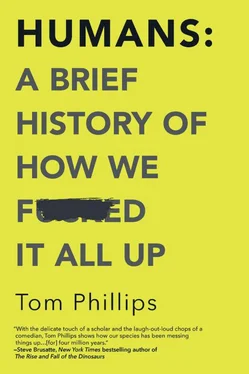Tom Phillips - Humans - A Brief History of How We F*cked It All Up
Здесь есть возможность читать онлайн «Tom Phillips - Humans - A Brief History of How We F*cked It All Up» весь текст электронной книги совершенно бесплатно (целиком полную версию без сокращений). В некоторых случаях можно слушать аудио, скачать через торрент в формате fb2 и присутствует краткое содержание. Город: Toronto, Год выпуска: 2019, ISBN: 2019, Издательство: Hanover Square Press, Жанр: История, Юмористические книги, на английском языке. Описание произведения, (предисловие) а так же отзывы посетителей доступны на портале библиотеки ЛибКат.
- Название:Humans: A Brief History of How We F*cked It All Up
- Автор:
- Издательство:Hanover Square Press
- Жанр:
- Год:2019
- Город:Toronto
- ISBN:978-1-48805-113-5
- Рейтинг книги:4 / 5. Голосов: 1
-
Избранное:Добавить в избранное
- Отзывы:
-
Ваша оценка:
- 80
- 1
- 2
- 3
- 4
- 5
Humans: A Brief History of How We F*cked It All Up: краткое содержание, описание и аннотация
Предлагаем к чтению аннотацию, описание, краткое содержание или предисловие (зависит от того, что написал сам автор книги «Humans: A Brief History of How We F*cked It All Up»). Если вы не нашли необходимую информацию о книге — напишите в комментариях, мы постараемся отыскать её.
Humans: A Brief History of How We F*cked It All Up — читать онлайн бесплатно полную книгу (весь текст) целиком
Ниже представлен текст книги, разбитый по страницам. Система сохранения места последней прочитанной страницы, позволяет с удобством читать онлайн бесплатно книгу «Humans: A Brief History of How We F*cked It All Up», без необходимости каждый раз заново искать на чём Вы остановились. Поставьте закладку, и сможете в любой момент перейти на страницу, на которой закончили чтение.
Интервал:
Закладка:
Consider that, in only the last few decades, the US has been involved in an armed conflict against al-Qaeda, which emerged from the mujahideen in Afghanistan, a group the US had previously supported on the grounds that they were fighting the Soviets. (I strongly recommend watching the 1987 James Bond film The Living Daylights if you’re a big fan of shouting, “OH WOW THAT DID NOT AGE WELL” at your screen. Bond teams up with the mujahideen, who are led by a charming, heroic character best described as “suave bin Laden with a posh English accent.” Good theme song, though.)
In that time, the US have also been involved in an armed conflict against Iraq, a country they had previously supported because they were fighting Iran, a country that opposed the US on the grounds that the US had supported Iran’s previous dictatorship, because they, too, opposed the Soviets.
And they’ve been in an armed conflict against ISIS, who grew out of the activities of al-Qaeda in postwar Iraq and are now fighting in Syria in what is at minimum a three-sided war, in which the US opposes a regime it previously supported and then tried to support the enemies of, but it turned out that some of the enemy regime’s enemies were also friends with ISIS, who are the enemies of both the US and the US’s enemies, although some other friends are enemies of both—oh, and Russia’s fighting there, too, just for old times’ sake.
And that’s just in one part of the world.
Look, international politics is really hard. There’s not much room for lofty ideals, and the cold hand of pragmatism means you often have to make do with the allies you can get, rather than the allies you really want. But a lot of the problems we run into time and time again might be avoidable if we remembered that, most of the time, the enemy of our enemy is just as much of a bastard as the original enemy.
But in the long history of really bad diplomatic mistakes, there’s one that stands out above all others.
In 1217, Ala ad-Din Muhammad II, the shah of the vast and powerful Khwarezmian Empire, received a neighborly message from the leader of a new power that had been growing in the east. “I am master of the lands of the rising sun,” it said, “while you rule those of the setting sun. Let us conclude a firm treaty of friendship and peace.” It proposed a trade deal between the two powers, to their great mutual benefit.
At which point Shah Muhammad II made the absolute worst decision in the long history of international diplomacy.
The Khwarezmian Empire was one of the most important in the world at the time, stretching almost from the Black Sea in the west to the mountains of the Hindu Kush in the east, from the Persian Gulf in the south to the Kazakh Steppe in the north. It covered a huge area that today includes either all or a large part of the territories of Iran, Uzbekistan, Turkmenistan, Tajikistan, Azerbaijan, Afghanistan and more. At a time when Europe was still a century or two away from getting its Renaissance on, Khwarezm was right at the epicenter of the developed world. It was through Khwarezm that the Silk Road ran, the great route that connected east and west, along which both goods and ideas flowed. The shah’s domain was one of the beating hearts of the Islamic world, by far the richest and most advanced culture in existence. Cities like Samarkand, Bukhara and Merv, the jewels of the Khwarezmian Empire, were among the great cities of Central Asia, renowned as places of scholarship, innovation and culture.
If you’re thinking: that’s odd, I’ve never even heard of the Khwarezmian Empire—yeah, there’s a reason for that .
You see, the message the shah had received was from a guy called Genghis Khan. And just a couple of years after he made his terrible decision… well, there wasn’t a Khwarezmian Empire anymore.

It’s worth noting that as far as history can judge, Genghis’s message of friendship to the shah was completely sincere. By this point, the great warrior had effectively achieved all his goals: he had conquered and united the nomadic peoples of northern China and the surrounding territories into his Mongol Empire, a series of conquests that ranged from the relatively easy to the profoundly brutal. He still had a few battles to win in the east, but no plans at all to push any farther west. This was as far as his ambition and desires stretched; and furthermore, he was nearing his sixties. Job done, time to start planning for a quiet retirement.
It was his recent conquest of the Qara Khitai—an empire of displaced Chinese nomads centered roughly on modern Kyrgyzstan, and one of the last holdouts against his reign—that had brought Genghis to Khwarezm’s doorstep and created a new border between the Mongol and Islamic worlds. As tends to happen at borders, especially ill-defined ones, there had already been one abortive military skirmish between the Mongol troops and the Khwarezmians. This took place when Muhammad II and his army turned up to have a battle with some of his enemies, only to find that the Mongols had annoyingly got there first and routed them already.
This wasn’t even the first time this had happened. Genghis seemed to have a habit of turning up first and winning wars that Muhammad had been planning on having himself—which might possibly help explain the shah’s ill-advised reaction to the olive branch that Genghis extended after that initial skirmish. He was, possibly, a little pissed off and humiliated that the Mongols kept on stealing his glory. (It should also have probably tipped him off that they were pretty good military tacticians, but eh, apparently not.)
Additionally, Khwarezm–Mongol relations seem to have suffered the kind of problems you always get when things are lost in translation. “I am master of the lands of the rising sun while you rule those of the setting sun” was probably just Genghis laying out some basic east–west geography and acknowledging their status as (roughly) equals. But here’s an alternative translation of the message: “I am the sovereign of the sunrise and you are the sovereign of the sunset.” Put it like that, and all of a sudden it sounds like Genghis is throwing a hefty amount of shade. To a ruler who was already feeling a little touchy about somebody else winning his battles for him, did it come across as effectively saying, “I’m a rising power and you’re a fading power, LOL”?
Conducted via a series of emissaries sent back and forth, the subsequent dialogue between Muhammad and Genghis plays out like a passive-aggressive comedy of manners. Genghis felt patronized by the gifts of fine silks the shah sent him (“Does this man imagine we have never seen stuff like this?”). He responded by sending back a gift of an enormous gold nugget, presumably in an effort to demonstrate that they had nice things, too, even if they lived in tents. At which point Genghis’s earnest repetition of his wish for peace—“I have the greatest desire to live in peace with you. I shall look on you as my son”—hit entirely the wrong note with Muhammad, who really was not a fan of being called “my son.” (This is much funnier if you say “my son” in a gruff cockney gangster voice, by the way.)
And yet, with formalities and protocol still being observed (despite the undercurrent of pettiness), Genghis clearly believed that his request for a peaceful trading relationship had been agreed to. For starters, it was so obviously a win-win for everyone. “You know that my country is an ant heap of warriors, a mine of silver, and that I have no need to covet other dominions,” as he told Muhammad in one message. “We have an equal interest in fostering trade between our subjects.”
Читать дальшеИнтервал:
Закладка:
Похожие книги на «Humans: A Brief History of How We F*cked It All Up»
Представляем Вашему вниманию похожие книги на «Humans: A Brief History of How We F*cked It All Up» списком для выбора. Мы отобрали схожую по названию и смыслу литературу в надежде предоставить читателям больше вариантов отыскать новые, интересные, ещё непрочитанные произведения.
Обсуждение, отзывы о книге «Humans: A Brief History of How We F*cked It All Up» и просто собственные мнения читателей. Оставьте ваши комментарии, напишите, что Вы думаете о произведении, его смысле или главных героях. Укажите что конкретно понравилось, а что нет, и почему Вы так считаете.












